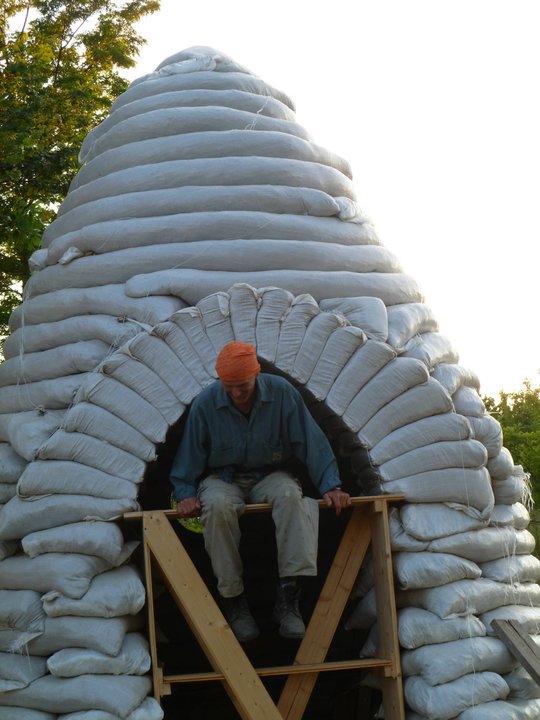Krishna Valley Visitors Learn Sustainability and Mud-House Building
By Madhava Smullen | Aug 27, 2011

Krishna Valley, a rural community well-known in ISKCON and beyond for its success in the fields of sustainability and self-sufficiency, has been generous in passing on its knowledge through its non-profit Eco Valley Foundation.
The 660-acre community, set in the Hungarian village of Somogyvámos and formed in 1993, holds an annual fair showcasing its natural spiritual lifestyle, which draws over six thousand people every year. It also presents ecological workshops at many different universities, while students from some of these universities personally visit the farm as part of their studies.
This year, one professor and seven university students from France, Germany, the US, and Belarus attended a seven-day mud house building workshop at Krishna Valley from June 6th to 12th, as part of their landscape development and management study.
Under Dr. Katalin Mate—who is experienced in sustainable construction and holds degrees from the Hungarian University of Art and Design, the University of Tasmania, and Ecole Nationale Superieure des Arts Décoratifs in France—the students built a small single-person dwelling themselves using the earthbag building technique.

“This kind of construction is used in many Middle Eastern countries and in some places in South America, and is said to be hurricane and earthquake proof,” says Eco Valley Foundation Director Radha Krishna Dasa. “The students built theirs using only simple tools and natural materials like hammers, wood, dirt and woven sacks filled with mud.”
As well as participating in the workshop, students stayed in the Krishna Valley guest house, ate with the devotees, and took an educational tour around the farm.
“I sincerely enjoyed the week beyond all expectancy,” says student Sophie Debarge. “First of all because of the human environment, which was rich, interesting and warm at the same time. I’m talking about my beloved fellow builders and our teacher, and about the inhabitants of Krishna Valley as well. They managed to be welcoming, kind and open, avoiding all kind of even unconscious proselytism in the discussions we had. And yet their very spontaneous and somehow discrete
attitude was the best way to make me think about my own values, those of the society I live in, and the way I consider my future.”

Meanwhile, Krishna Valley has also recently begun offering annual workshops on developing sustainable communities, aimed at ISKCON devotees and members of the general public around the world who are either already running rural communities or planning them.
In the past two years, Russia benefitted from Krishna Valley’s valuable experience, while this year it will be Europe’s turn, in a week-long workshop entitled “The Pillars of Sustainability” which will be offered at Krishna Valley from October 9th to 16th.
All costs of the workshop—including participants’ travel, accommodation, and food, as well as organization of the event—will be covered by a grant from the
European Commission as part of its Grundtvig Life Long Learning Programme. The Eco-Valley Foundation was one of only four organizations that received the grant, out of fifty applicants.

“According to the grant’s guidelines, we will offer the workshop to only twenty people from various European countries, and ten from Hungary,” says Radha Krishna Dasa. “The European Commission’s website is advertising it, and already fifty people from twelve countries have applied.”
Since The Pillars of Sustainability was first advertised amongst the devotee community, most of the attendees will be leaders or members of ISKCON’s rural communities in Europe.
The workshop, taught by internationally renowned authorities and leaders of the successful Krishna Valley project, will cover four main topics: Society and Sustainable Development, Managing Self-sustaining Communities, Organic Farming and Social Security.
“Learners can attend lectures in these particular fields as well as participate in the workshops, field-surveys and fieldworks,” says Radha Krishna. “There will also be a lot of interactive activities and games that will help all the attendees understand and apply the learned skills.”

Participants are expected to develop a systematic understanding of the correlation between social, economic, and environmental considerations. They will also learn to recognize and solve problems, and to navigate the natural ups and down in the management and development of sustainable communities.
Ultimately, Radha Krishna hopes that The Pillars of Sustainability will result in attendees gaining inspiration and commiting themselves more to establishing sustainable communities.
“It should create an attitude of ‘Yes, it can be done!’ and ‘Yes, we will!’” he says.
In the future, Radha Krishna hopes to organize similar workshops in other countries, and eventually to develop a complete handbook on building sustainable communities based on practical experience.
“It would list the different obstacles, give answers, and prepare people to solve problems on their level, whether they’re a gardener or a leader of the community,” he says.














